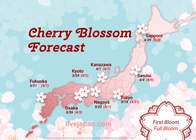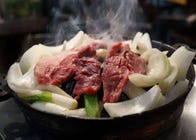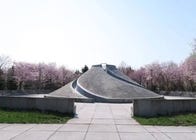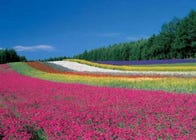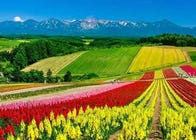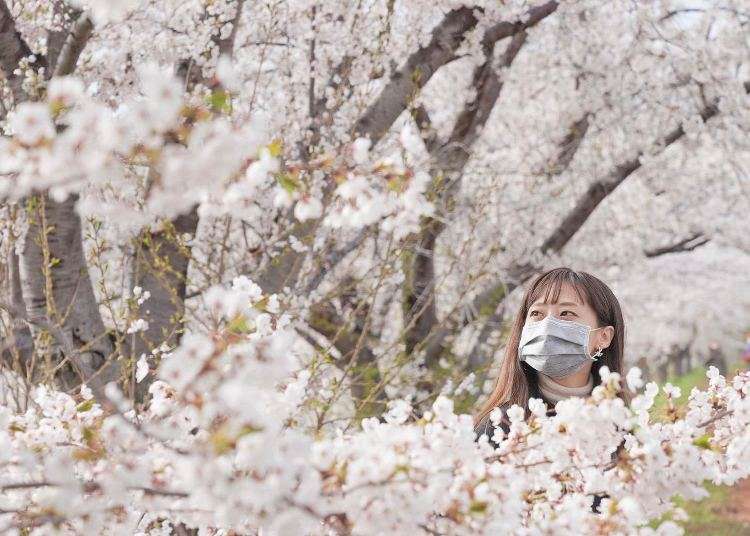
Hokkaido is the very last place in Japan you can catch sakura blooms during spring season due to its northern location. The prefecture's unique climate means you can see some species of sakura that may not be found on the main island too!
We asked Ching Yu, the Taiwanese author of travel guide "Stylish Hokkaido Traveling" and long-time resident of Sapporo to share with us her personal sakura spots in Hokkaido as well as some special features that make them unique. This is a must-read for fans of sakura traveling to Hokkaido in spring!
Photo courtesy of Ching Yu's Facebook fan group "A Taiwanese Woman's Hokkaido Life"
The Low-Down on Sakura Season in Hokkaido According to a Local
This time, the interviewed Seiyu has over 10 years of experience living in Sapporo. She owns a Facebook fan page called "Taiwanese Woman's Hokkaido Life" with 160,000 followers. She even published a personal travel book about Hokkaido titled "Hokkaido Style Slow Travel." With her deep knowledge of Hokkaido, what cherry blossom spots will she introduce to us? Let's take a look at Seiyu's pocket list!
1) Sakura Season in Sapporo: Late April to May
Since it's generally colder up north in Hokkaido, the sakura here will bloom slightly later than usual. They start appearing only in late April, but that also means they will remain in bloom until around the middle of May. According to Ching Yu, a Sapporo resident who has lived there for more than 10 years, sakura season in Hokkaido tends to be more stable, not fluctuating as dramatically as other regions if there are no drastic weather changes that year. Therefore you can almost definitely count on seeing sakura between late April to mid-May and shibazakura (lawn sakura) from mid-May to June in Hokkaido.
Ching Yu adds, "The thing is, spring is over quickly in the eyes of many Hokkaido locals. As soon as it starts hitting 24 to 25 degrees Celsius (about 77 degrees Fahrenheit) in the afternoon, we consider it summer already! That's why there's actually only about a week between late April to the start of May that we view as spring. This is also the period of time most of us head out to admire the sakura."
Whatever the case, this is certainly great news for those of us who are unable to arrange for a trip to Tokyo, Osaka, or Kyoto during the mainstream sakura season in March to April. For a guaranteed view of this iconic Japanese sight surrounded by a cool and pleasant northern breeze, there's always Hokkaido in May!
2) Features of Hokkaido's Sakura
If you've already seen sakura in other parts of Japan, you may find something a little different about the ones you get to see in Hokkaido. The colors of the petals tend to be more vibrant because most of the other sakura in Japan are of the Somei-Yoshino species, which is known for its pale pink hues. In Hokkaido, however, the most common sakura tree are ezo-yamazakura, and the flowers of this species lean towards orange-red. So be prepared for a vivid visual treat when you do visit!
Ching Yu explains, "Many popular sakura spots in Tokyo and Kyoto feature cultivated trees. That's why you'll see manicured sakura avenues or a dense cluster of sakura growing in one area. Hokkaido sakura, on the other hand, mostly grow in the wild, so they may appear somewhat haphazard in comparison."
As you can see, the sakura in Hokkaido differ from those in other areas both visually as well as in terms of general landscape. Some may prefer to see them in the wild, while others prefer a more curated sight. Which one is your cup of tea? There's only one way to find out!
3) Do-O Expressway Transport: Trains, Buses, Driving Your Own Car
Many travelers to Hokkaido focus on the Do-O region, a huge area that covers the central part of the island. Its central location means it has access to many different types of transportation tools. If you only plan to admire the sakura in Sapporo, then stick to the Sapporo Municipal Subway. It will serve your needs very well as many of the better viewing spots in the city are located near subway train stations.
As for Do-Hoku, the northern region, it's home to a number of globally famous flower spots like Furano and Biei that transform into amazing sakura spots for a short period of time during spring season. Towards the east, in the Do-To region, you'll find several popular shibazakura parks like Higashimokoto Shibazakura Park and Shibazakura Takinoue Park. One of the most convenient ways to admire the mesmerizing sight of these lawn flowers is to sign up for a one-day bus tour. The experienced guide and driver will take you to the best spots and you can relish the view from the comfort of an air-conditioned seat!
It's a bit more of a hassle to cover the sakura and shibazakura spots of Do-Hoku and Do-To using train services. While Furano and Biei are equipped with JR train stations, the trains setting off from Sapporo head to other destinations first and will take about one to two hours longer than a bus to reach those stations. What's more, the flower viewing spots in Do-To are more than an hour's drive away from the nearest station. Quite a bit more planning is involved if you intend to go around the flower spots in these two areas using public transportation. Don't forget to set aside a lot of time for the journey as well as contingencies!
Want to have more flexibility in your trip? Then you can do no better than renting a car and driving around yourself on your own schedule! Not only does it free up a lot of empty traveling time that would otherwise be consumed by trains and buses, it's also adds an extra layer of fun, since Hokkaido roads in spring and summer are a lot easier to navigate around in than they are in winter. Trust us - try it once and you'll be hooked!
9+1 Sakura Hotspots Personally Recommended by Ching Yu From "A Taiwanese Woman's Hokkaido Life"
1. Sapporo: Maruyama Park, Hokkaido Shrine
Maruyama Park is a large, 70-hectare wide park that is home to more than a park. Inside is where you'll also find other places of interest such as Hokkaido Shrine and Maruyama Zoo. The place is naturally endowed with an abundance of enjoyable natural sights all year round and unsurprisingly one of the more popular places for tourists in Sapporo. Between late April to the start of May every year, ezo-yamazakura, the local species of sakura, start blooming beautifully and the scene attracts visitors from all over Japan and the world as this period coincides with the Japanese Golden Week, a week-long public holiday. While you're here, don't forget to check out the Hokkaido Shrine and other tourist hotspots in the park as well.
There is a lot of grassy lawns in Maruyama Park that the locals make use of for sakura appreciation picnics. There's a saying in Japan: "Hana yori dango (Dango dumplings over flowers)." It means that the main purpose of these flower admiration sessions is not to get intoxicated from alcohol or the sight of pretty petals, but to enjoy the food, like dango dumplings! Ching Yu comments humorously that the locals have their own version: "Hana yori jingisukan (Grilled mutton over flowers)!"
▲Nakajima Park engulfed in the smoke of flower admirers grilling up a storm! (Photo courtesy of Ching Yu’s Facebook fan group “A Taiwanese Woman’s Life in Hokkaido)
She further adds, "Barbeque and grills are usually not allowed in Maruyama Park, except during the week of sakura viewing. That's why oodles of people swarm to the park and set up their jingisukan equipment every May during flower season. The entire place fills up with the fragrant smoke of grilled mutton and the locals love it like this! This concession was canceled during the pandemic but there's a high chance it may make a return this year. Whatever the case, admiring flowers through a veil of aromatic smoke is certainly a phenomena you won't get to see anywhere else in Japan!"
-

-
Address
474 Miyagaoka, Chuo-ku, Sapporo-shi, Hokkaido, 064-0959
View Map -
Nearest Station
Maruyama koen Station (Tozai Line)
15 minutes on foot
- Phone Number 011-611-0261
-
Address
474 Miyagaoka, Chuo-ku, Sapporo-shi, Hokkaido, 064-0959
-

-
Address
Miyagaoka, Chuo-ku, Sapporo-shi, Hokkaido, 064-0959
View Map -
Nearest Station
Maruyama koen Station (Tozai Line)
5 minutes on foot
- Phone Number 011-621-0453
-
Address
Miyagaoka, Chuo-ku, Sapporo-shi, Hokkaido, 064-0959
2. Sapporo: Nakajima Park
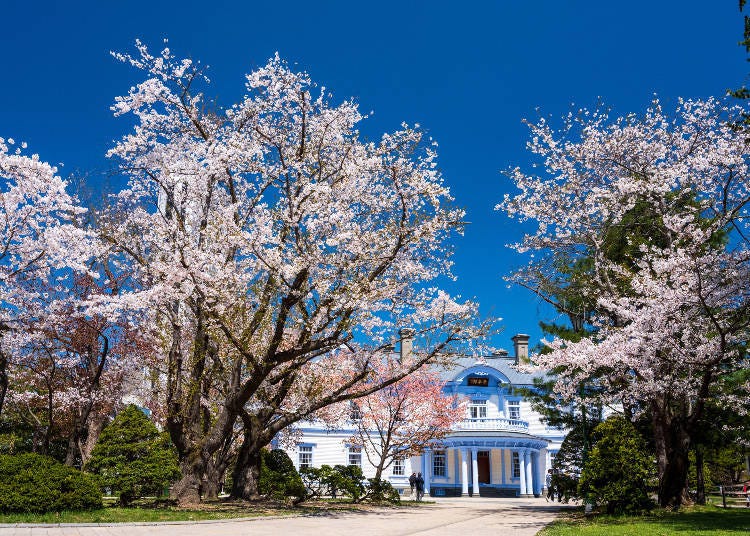
A lovely green oasis in the city, Nakajima Park has 21 hectares of nature and is conveniently located right next to the Nakajima Park Station on the Sapporo Municipal Subway. You'll find about 400 sakura trees of various species in the park, from oyama-zakura to somei-yoshino and yae-zakura. The best period to see these trees in full bloom is between late April to early May every year. While you're here, consider also dropping by the historical buildings such as the Japanese garden teahouse or olden Western buildings located on park premises to enrich your visit. The vintage architecture of these places will put you in a pleasantly different frame of mind during your flower admiration.
According to Ching Yu, Nakajima Park is a very nice city park that is well-equipped with places to go and things to see, like a man-made pond and plenty of historical buildings. This means the landscape is a bit different from parks that purely feature nature. And there's another important difference: grilling is not allowed in Nakajima Park, so you don't have to be afraid of coming home smelling of meat after your flower stroll!
-

-
Address
Nakajimakouen, Chuo-ku, Sapporo-shi, Hokkaido, 064-0931
View Map -
Nearest Station
Nakajima koen Station (Namboku Line)
- Phone Number 011-511-3924
-
Address
Nakajimakouen, Chuo-ku, Sapporo-shi, Hokkaido, 064-0931
3. Sapporo: Former Hokkaido Government Office
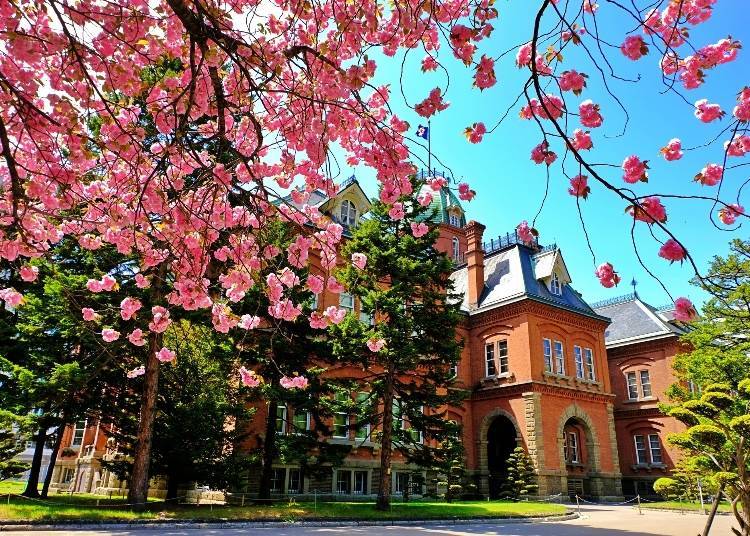
This Western-style red-brick building about five minutes away from Sapporo Station on the Sapporo Municipal Subway is tucked away in a beautiful and well-maintained garden that's another one of Sapporo's top places of interest. In its vicinity are many sakura trees of the rarely seen yae-zakura species, known for their vibrant pink hues. The flowers are framed by the contrasting background of fresh green leaves and weathered red walls, further enhancing their brightness and beauty.
According to Ching Yu, another advantage to this location is the fact that you can still enjoy seeing the sakura even if you reach a little later than usual. This is because yae-zakura flowers tend to blossom later, so some will still be in full bloom during mid-May!
(*The Former Hokkaido Government Office will undergo renovations from 1 October, 2019 to March 2023. During this period, the building will be covered up by scaffolding and work tents. For the latest information on the works being carried out, please visit their official homepage.)
-

-
Address
6-chome, Kitasanjo Nishi, Chuo-ku, Sapporo, Hokkaido, 060-8588
View Map -
Nearest Station
Sapporo Station (Hakodate Main Line)
7 minutes on foot
- Phone Number 011-204-5019
-
Address
6-chome, Kitasanjo Nishi, Chuo-ku, Sapporo, Hokkaido, 060-8588
4. Sapporo: Civil Engineering Research Institute for Cold Region (CERI)
The institute is located in Sapporo's residential area. It is a three-minute walk from Nakanoshima Station, which in turn is a eight-minute ride from Sapporo Station on the Municipal Subway. Planted on both sides of the little stream inside institute grounds are about 180 chishima-zakura trees. As you might expect, this is a popular place for fans of this species to gather for admiration sessions, usually between late April to early May. However, because this is an education facility, the administration only allows outside visitors access for about a week's time at the end of April for sakura viewing, so be sure to plan well to take advantage of this window of opportunity. There are far fewer visitors to this place than the other mainstream sakura spots, so those who prefer to admire their flowers at a leisurely pace may appreciate the silence and solitude it offers.
"I personally think the sakura trees at CERI are more densely packed compared to other areas," Ching Yu comments. "Also, because they're lined up on both sides of a little stream that comes with a small bridge, it's very suitable for taking photographs in! This is a secret scenic spot for the locals because not many visitors to Sapporo are aware you can come inside here for sakura appreciation during the season."
-
Civil Engineering Research Institute for Cold Region (CERI)寒地土木研究所
- Address 1-34 Hiragishi 1-jo 3-chome,Toyohira-ku, Sapporo, Hokkaido 062-8602
Hours: 8:30 a.m. — 5:30 p.m. (Only open for visitors during sakura season)
Official website: https://www.ceri.go.jp/
5. Sapporo: Shiroishi Kokoroad (Sapporo Eniwa Cycling Road)
The next popular Sapporo sakura viewing spot is Shiroishi Kokoroad, a cycling track that Ching Yu claims every bona fide cycling enthusiast is aware of. Officially, the road is a 20-kilometer (about 12.5 miles) cycling path known as the Sapporo Eniwa Cycling Road and only pedestrians and cyclists are allowed. There are rows of ezo-yamazakura sakura trees planted on both sides of the road, their pink petals ready to refresh and entertain those walking or cycling along the track during sakura season.
To get started on this rather long path, we recommend that you take the Municipal Subway from Sapporo Station to Shiroishi Station. This will take about seven minutes. After that, shop and stroll around the vicinity for a bit. You can even take some pictures at the nearby Kanjo Yume-no-hashi (Circular Dream Bridge) if you like, since it's only about a 5-minute walk away. Ching Yu adds,"There are no bicycle rentals available in Sapporo, so many people just walk around for their flower admiration. If you're organizing a Hokkaido bicycle trip in spring, however, this is one cycling track you can't not include!"
-
Shiroishi KOKOROAD白石こころーど(札幌恵庭自転車道線)
- Address Kanjo Yume-no-hashi Bridge, Shiroishi Ward, Sapporo City, Hokkaido 003-0002
Open daily
6. Sapporo: Moerenuma Park
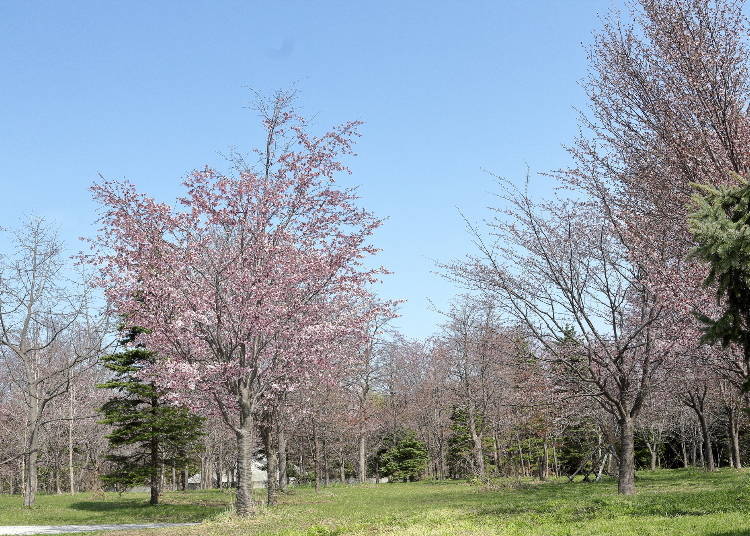
A green park designed by world famous architect Isamu Noguchi with a harmonious blend of nature and art as its main theme. You'll find a lot of geometrical elements in the park, such as the glass pyramid and Mount Moere, alongside other installations like a fountain and children's amusement facility, making it a very family-friendly place to visit. The park's Sakura no Mori (Sakura Forest) starts being covered with a pink canopy from early May to mid-May, and since there are about 1,600 sakura trees here, the landscape is guaranteed to look magnificent in full bloom.
The 189-hectare wide park is full of so many things to see and do that Ching Yu has already visited it more than 10 times while living there. This is an especially relaxing place to walk around in during spring or autumn.
7. Furano: One Cherry Tree of Kamigoryo
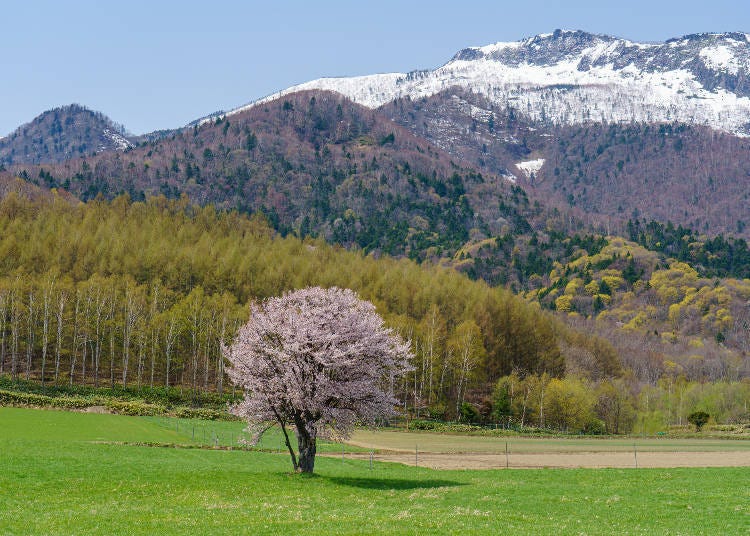
As one of the region's top flower viewing spot, Furano is also equipped with plenty of great sakura viewing spots and is thus an extremely popular tourist destination during spring and summer. A couple of sakura spots to consider are Nakafurano Shrine and the University of Tokyo Hokkaido Forest (UTHF). The most Hokkaido-like sakura scene you can see in Furano, however, is probably the One Cherry Tree of Kamigoryo. As its name suggests, this is a single ezo-yamazakura sakura tree in the Kamigoryo area of Furano, about a 7-minute drive from Nunobe Station on the JR Lines. It stands tall against the backdrop of the snowcapped Mount Furano-Nishi, and the vivid contrast between colors is poetically picturesque to a T. The charm it exudes is completely different from most other sakura viewing spots.
"Yes, it's just a single tree," Ching Yu admits, "but you can take a picture of this single tree with a still snowy mountain in the background during sakura season. Many photographers love to make this scene the subject of their camera lens, which means it's a great spot to visit for unique photos of sakura." Just one thing to note: The single tree is located on private property so you can only take a picture of it from the road on the farm side. While you do so, be careful not to trample on any of the farm produce that's been carefully planted in the field!
-
One Cherry Tree of Kamigoryo上御料の一本桜
- Address Kamigoryo, Furano City, Hokkaido 076-0015
Open daily
8. Hakodate: Goryokaku Park
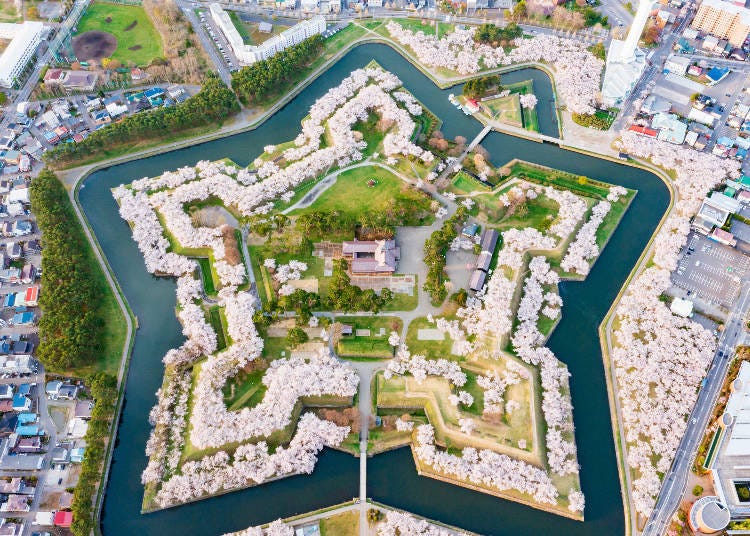
"This isn't in Sapporo, but you can bet it's one of the first places that come to the mind of a Hokkaido local when you mention sakura viewing!" explains Ching Yu. Goryokaku Park is built in what used to be a star-shaped fortress surrounded by a star-shaped moat. The shape alone is enough to attract quite a lot of attention and it's no wonder the park has been listed as one of Japan's Special Historical Sites. There are about 1,500 sakura trees of all species planted within, with the main one being somei-yoshino. You're bound to have a memorable experience whether you intend to enjoy the sight of the sakura from the ground or atop the fortress.
"There are usually some minor events going on here during sakura season as well," says Ching Yu. "The sakura will also look different at night because of the special lights. I daresay this is probably the most well-known sakura viewing spot in Hokkaido!"
(*Goryokaku Park sakura illuminations at night: Late April, 2023 — Early May, 2023. Check official website for latest information.)
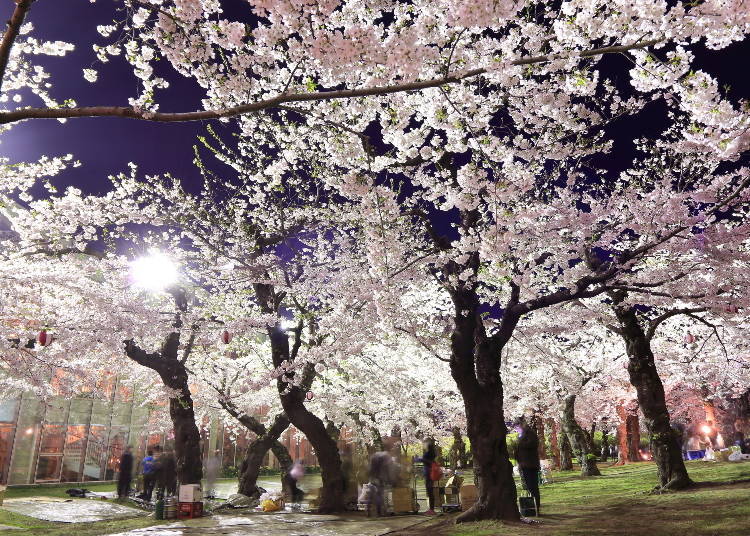
9. Do-To: Nijukken Road Cherry Blossoms
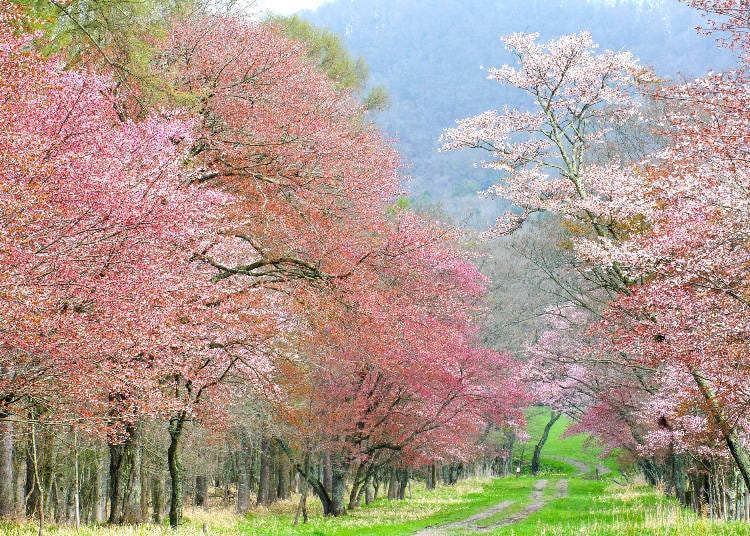
This seven-kilometer (about four miles) long road with about 2,200 sakura trees planted on both sides is one of Ching Yu's top sakura view spot recommendations in Hokkaido! The main sakura species here is ezo-yamazakura - almost 80% of all the trees are of this type - and they are interspersed with various other species like the Japanese cherry and Miyama cherry with whitish petals. The result is a thick canopy of vibrant pink and clean white that looks like a woven fabric of intricate design. In recognition of its beauty, Nijukken Road is listed as one of Japan's top 100 roads, top 100 sakura spots, and a Hokkaido heritage. The Shizunai Sakura Festival is held here during blooming season every year, somewhere between early May to mid-May. Participating shops will sell various souvenirs for you to remember your trip by and there's even a horse range and farmhouse nearby open for visits. You can't go wrong with Nijukken Road for your Hokkaido sakura trip!
"The sakura trees here were planted when the Emperor came for a visit," Ching Yu explains, "which is why they seem so densely packed. If you've seen photos of the place and think they look astounding, wait till you come and see and be touched by the real thing!"
-

-
Address
Shizunaitahara-Shizunai Misono, Shinhidaka-cho, Hidaka-gun, Hokkaido, 056-0144
View Map -
Nearest Station
Shizunai Station (Hidaka Main Line)
- Phone Number 0146-42-1000
-
Address
Shizunaitahara-Shizunai Misono, Shinhidaka-cho, Hidaka-gun, Hokkaido, 056-0144
Bonus 10. Do-To: Shibazakura Takinoue Park
Located in Takinoue Town, this is Japan's largest shibazakura park with a surface area of about 10 hectares. Every year, the lawn flowers start appearing between May to June, covering the mountain slopes with a fresh coat of petal pink paint. The Shibazakura Festival is also held during this period. There will be mascot meet-and-greets, shibazakura ice-creams, ramen, skewered meat, and other regular booth tasties. Another special activity you can consider is a helicopter ride that will give you a bird's eye view of the entire mountain slope - something that can't be experienced in shibazakura spots in other parts of Japan!
"I took that helicopter before!" Ching Yu exclaims. "The sight from above is indeed very much different from the sight you get to enjoy when strolling through the shibazakura on the ground." Although shibazakura is technically not a part of the sakura family, their beauty is so astounding that many secretly add it to their sakura trip anyway. A good choice!
-

-
Address
Motomachi, Takinoue-cho, Monbetsu-gun, Hokkaido, 099-5604
View Map -
Nearest Station
Asahikawa Station (Soya Main Line / Hakodate Main Line / Furano Line)
- Phone Number 0158-29-2730
Vacancy search, reservation
-
from 15,580JPY 1room, 2adults
Check with our partner site as the latest rates, rate details, and guest room requirements may vary.
-
Address
Motomachi, Takinoue-cho, Monbetsu-gun, Hokkaido, 099-5604
As the cold fist of winter slowly loosens its grip on the land of Hokkaido during spring, new life can be seen sprouting steadily across the region, and soon, the branches of many sakura tree will start putting on their pale pink clothing. Hokkaido's unique climate also means that flowers start wilting quickly after they bloom. As long as you diligently keep up with the latest information about sakura season, however, you should be able to plan something that allows you to make full use of this golden opportunity that nature has prepared for all!
Translation by: Huimin Pan
- Area
- Category
*Prices and options mentioned are subject to change.
*Unless stated otherwise, all prices include tax.
Popular Tours & Activitiess
Recommended places for you
-

Niseko Village Ski Resort
Skiing & Snowboarding
Niseko / Rusutsu
-
Appealing

Rukku and Uohei
Izakaya
Sapporo / Chitose
-
Appealing

Mt. Hakodate Observatory
Forests & Mountains
Hakodate
-
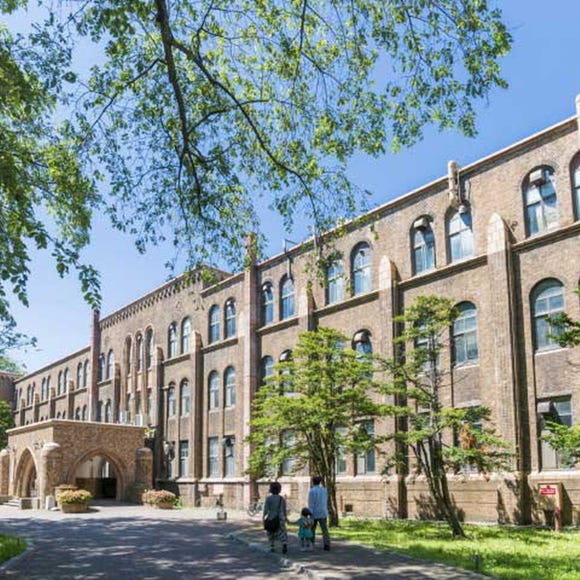
Hokkaido University
Other Architecture
Sapporo / Chitose
-
Appealing

Odori Park
Parks
Sapporo / Chitose
-

Former Hokkaido Government Office Building (Red Brick Office)
Other Historic Sites
Sapporo / Chitose
-

Jozankei Onsen: 10 Luxurious Hotels with Private Hot Springs & Stunning Views Near Sapporo
by: Robotan
-

BIGGEST SALE ALERT! SATUDORA Tax-Free Winter Sale: Stack Coupons for Massive Savings!
by: Guest Contributor
-
Ad

Explore Eastern Hokkaido from Tancho Kushiro Airport: Your Gateway to Grand Nature
-

Expert-Recommended: 9 Hakodate Hotels Serving Up the Best Breakfasts in Town
by: Nobuka Kawashima
-
Ad

Welcome to Sapporo! Here’s How to Expore the Ciy Like a Local
-

Explore Japan in 7 Days: The Ultimate Local Rail Adventure with the Hokkaido & East Japan Pass
by: Guest Contributor
-

Missed Sakura in Tokyo? Hokkaido's Cherry Blossoms Bloom Later (Here’s Where to Go in 2026)
-

Sapporo Cherry Blossom Guide: Best Time & Top Spots for Sakura Viewing
by: Andy Cheng
-

Noboribetsu Onsen: 5 Best Things to Do in Japan's Famous Hot Springs Town!
-

5-Day Hokkaido Road Trip Itinerary for Spectacular Sights in Spring/Summer
-

(Video) Walking Tour along Narita Omotesando - Quaint Historical Village near Narita Airport!
by: Victor Gonzalez
-

Visiting Hokkaido in Spring (March, April & May): Weather, What to Wear, and Late-Blooming Cherry Blossoms
by: Nemi Lin
- #best sushi hokkaido
- #things to do hokkaido
- #best ramen sapporo
- #what to bring to japan
- #new years in tokyo
- #what to buy in ameyoko
- #japanese nail trends
- #what to do in odaiba
- #onsen tattoo friendly tokyo
- #daiso
- #best sweets otaru
- #japanese fashion culture
- #best nature furano
- #japanese convenience store snacks
- #best japanese soft drinks













